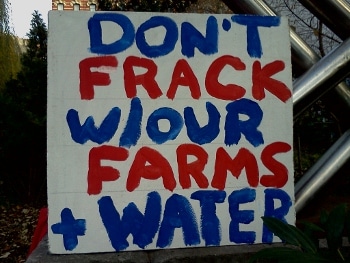New York Governor Andrew Cuomo has said repeatedly that, in making the decision on whether to allow horizontal hydrofracking in New York State, he wants to rely on “science, and not emotion.” He is relying on the NY Department of Environmental Conservation (DEC) to give him that science – but an array of documents suggest the Governor is being badly served.
Documents recently uncovered by Environmental Working Group shine a unique spotlight on privileged access granted to gas industry lobbyists by DEC officials with regards to fracking.
Some of the most important conversations revealed in those pages have little to do with debate over the science of fracking’s environmental footprint – and everything to do with the politics of ending New York’s temporary moratorium and allowing shale gas fracking to move forward in the state.
Governor Andrew Cuomo has gone to great lengths to present the course his state will take with regards to fracking as the opposite of Pennsylvania’s drill-baby-drill approach, which has left regulators scrambling to keep up and allowed a growing list of problems to emerge. By contrast, New York will make an incremental, guarded entry into fracking, Cuomo alleges. And his regulators will take an approach that rises above the fray of conflicts between industry and environmentalists.
“We have a process. Let’s get the facts,” Governor Cuomo said last year, with regards to ending the state’s temporary moratorium on fracking. “Let the science and the facts make the determination, not emotion and not politics.”
But it’s increasingly clear that the process has actually been based on anything but science. Politics, legal considerations and economic concerns have instead predominated. Most tellingly, documents recently uncovered by Environmental Working Group show that industry representatives allowed access to drafts of the state’s permit plans, and used that information to lobby hard against testing for radioactivity in wastewater, for example.
But the documents also show a regular pattern of behind-the-scenes communication between the industry and regulators, at the same time as environmental advocates and others were struggling to be heard through public comments and similar official channels.
The flow of email traffic is steady, the documents show, and there are references to conversations happening on the side. “Let’s talk in the morning,” writes a DEC official to an industry lobbyist, indicating that phone calls and other contacts took place beneath the public radar.
We don’t know what happened during those conversations of course. “We were very careful what we put in emails,” the industry lawyer and lobbyist, Tom West, admitted on a July 5 appearance on Capitol Tonight.
Nonetheless, in those emails, extensive lobbying takes place, and industry is provided an early look at the plans the DEC is developing weeks before the public comment period began.
DEC officials have defended their decision to provide the industry with these drafts of regulations, saying that state law required them to calculate the costs of complying with rules.
“DEC could not possibly fully understand the potential costs of regulations without seeking input from the affected regulated entities,” wrote Emily Desantis, Director of Public Information at the Department of Environmental Conservation in a July 4 letter to the editor of the Albany Times Union. “To imply there was anything untoward in DEC‘s actions is irresponsible and uninformed.”
But the documents show that the private discussions often centered on topics that had little or nothing to do with costs.
The topic of home rule, or local regulation of drilling under zoning laws, which Governor Cuomo hinted this week that he supports, comes up again and again. The documents show representatives of Chesapeake Energy, one of the most aggressive drilling companies, lobbying hard.
Some background: In early July 2011, DEC Commissioner Joe Martens seemed to indicate that his department’s permitting process would take local bans and zoning rules into account. “If we can’t decide on our own, then it may become an issue just between the applicant and the local government,” Martens told the Star Gazette. “It may be that the courts will have to decide if something is consistent or not consistent (with local ordinances).”
These comments seem to have drawn a strong objection from Tom West, attorney for Chesapeake Energy, a July 7, 2011 email shows. West wrote to Steve Russo, general council for the DEC, that “some of the comments being made to the Commissioner … overstate both the law and the discussion of the local preemption issues in the draft document.”
In another e-mail [PDF], West again objects to the way the department might handle zoning questions, arguing that Martens has no right to decide zoning issues, and for a commissioner to do so would be to “arrogate unauthorized power to himself”.
The legalese is dense, but these issues are of great importance. In New York state there now are more than a hundred municipalities that have set in place bans and moratoria to prohibit fracking in their communities. The DEC’s approach to permitting could decide who will have the upper hand in enforcing those bans – crucial questions for small towns and counties with limited budgets to fight lengthy court battles.
Another exchange suggests that the DEC has already taken steps at industry urging.
In a July 25, 2011 letter from Dennis Holbrook, Executive Vice President of Norse Energy to Commissioner Martens, Holbrook writes that the DEC‘s initial advisory panel “can only be strengthened by including additional, relevant viewpoints. Specifically, the panel is light in terms of industry representatives…”
In a September 29, 2011 letter, Commissioner Martens responds to Dennis Holbrook. “I am pleased to inform you that five new members were added representing local governments, the agricultural community, landowners, and the natural gas industry,” he writes. “I believe these additions will make for a complete panel for this important review.”
When the DEC began the process of determining how fracking would be regulated, residents were told that New York State would conduct a study that would be built on a solid scientific basis.
But after early drafts showed a lack of attention to key issues, an unprecedented flood of public comments, many from prominent scientists and experts, has raised serious concerns about the adequacy of Cuomo’s approach. Major flaws in the state’s draft plan have been pointed out again and again.
For example, in a June 13 letter, seventy New York state legislators on both sides of the aisle pointed out six major issues they said were under-addressed, including the impacts that fracking could have on homeowner’s insurance and on mortgages, industry exemptions from hazardous waste handling rules, and the practice of disposing of wastewater by spraying it on roads.
Instead of focusing on issues like these, DEC staff were busy discussing zoning questions with industry lawyers and providing drillers with a chance to weigh in on the expense of complying with environmental protections.
It’s time for Governor Cuomo to send the DEC back to the drawing board, and this time, they should pay closer attention to science and the public interest than they have clearly paid to gas drillers and their lobbyists.
Subscribe to our newsletter
Stay up to date with DeSmog news and alerts







